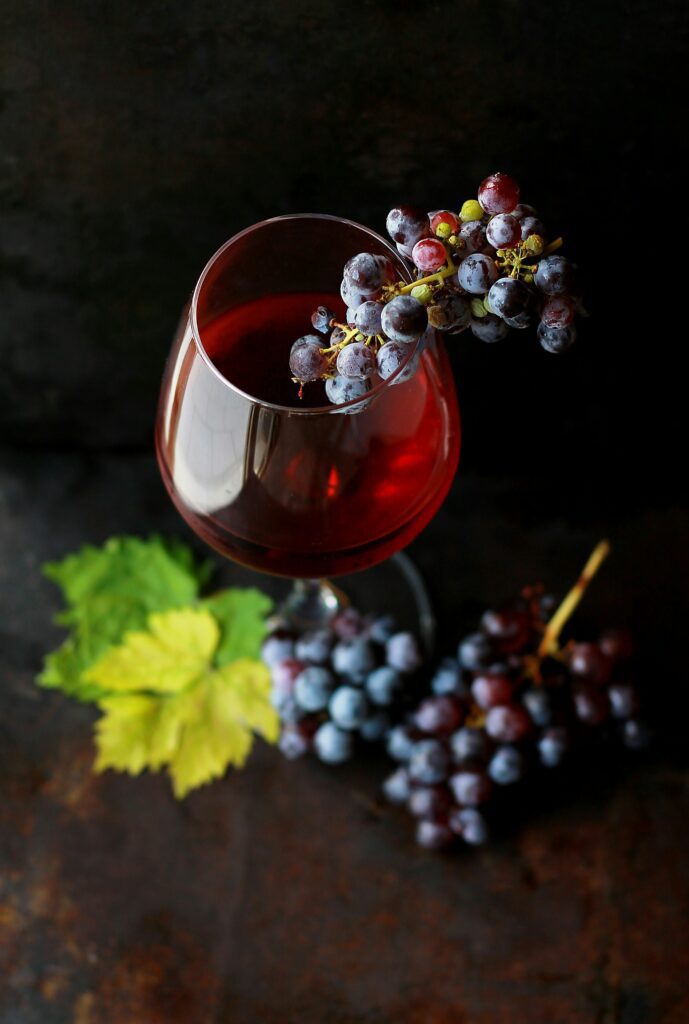Some people think of alcoholic beverages as inherently wrong and harmful. They see the harm — people killed by drunk drivers, homes broken by persistent drunkenness, wild parties that leave everyone with hangovers — and think it’s better for everyone to just stay away from all alcohol, always. Others have no problem with the beverages themselves, only with the mis-use of them. What does the Bible have to teach us about this subject?
In researching for this article, I found 237 references with the word “wine” and 105 references to “vineyard”. I found 18 with “strong drink”, 43 with “drunk” (although some of those were not referring to alcohol, as in “when he had drunk water”), 14 with “drunkard” and 7 with “drunkenness”. Within those passages, I found
- Wine as a good thing, part of the normal produce of the land. It was included in offerings, and used as an indication of prosperity, joy, and blessing.
- Specific instances forbidding anything alcoholic
- Universal condemnation of drunkenness or over-indulgence
Let’s look at these in a bit more detail.
Wine in General
The many references to wine were most often listing it along with other agricultural products. For instance, in the Sabbath years when debts were forgiven and slaves were freed, a released servant was to be sent out with provisions, including wine (Deuteronomy 15:12-15). There are passages that compare Israel to a vineyard, with God as the owner (See Isaiah 5:1-7, Isaiah 27:2-3 and Matthew 21:33-41). And, Jesus’ first miracle was to turn water into wine at the wedding in Cana, so the family would not be embarrassed by running out (John 2:1-11).
Wine is one of the products given as offerings in the temple:
- There is even a specific “drink offering” of a certain amount of wine (Exodus 29:40, Leviticus 23:13, Numbers 15:4-5, Numbers 28:14).
- Of those tithes, the priests and their families were allowed to take a share (Numbers 18:1-13, especially verse 12).
- There were Levites tasked with overseeing the wine and other plant-based offerings (1 Chronicles 9:29).
- When King Darius of Persia sent Ezra and other Jewish exiles back to Jerusalem, allowing them to rebuild the temple after their captivity in Babylon, he instructed his governors to provide everything needed for offerings, including wine (Ezra 6:8-10).
- As Nehemiah re-instituted worship at the new temple, the covenant to which the people agreed included wine for the offerings (Nehemiah 10:28-39, especially verses 37 & 39).
The same theme of wine along with other produce carries on in passages describing God’s blessings. The first I find is in Deuteronomy (below) but there are many others, including Deuteronomy 11:13-15, , Psalm 104:14-5, Proverbs 3:9-10, Isaiah 25:6-9, Isaiah 62:8-9, Jeremiah 31:12, Hosea 2:21-23, Joel 2:18-19, 24, Joel 3:18, and Amos 9:14.
He will love you and bless you and multiply you; He will also bless the fruit of your womb and the fruit of your ground, your grain and your new wine and your oil, the increase of your herd and the young of your flock, in the land which He swore to your forefathers to give you.
Deuteronomy 7:13
There is also the reverse: Loss of wine as well as other produce as punishment for sin. Examples include Deuteronomy 28:49-52, Isaiah 16:9-10, Isaiah 24 (especially verse 9), Jeremiah 48:32-33, Hosea 9:1-2, Zephaniah 1:12-13, and Haggai 1:7-11. But my favorite is from Hosea:
For she [Israel] does not know that it was I who gave her the grain, the new wine and the oil,
Hosea 2:8-9
And lavished on her silver and gold,
Which they used for Baal.
“Therefore, I will take back My grain at harvest time
And My new wine in its season.
I will also take away My wool and My flax
Given to cover her nakedness.
Wine is also used in metaphors, sometimes for joy (Psalm 4:7, Isaiah 55:1, Zechariah 10:7) and sometimes for wrath (Psalm 60:3, Psalm 75:7-8, Jeremiah 25:15-16).
Specific Instances
There are cases where someone is commanded to avoid all alcoholic beverages. Those include:
- Priests when serving in the temple (Leviticus 10:8-11, Ezekiel 44:21)
- Those who voluntarily take a Nazarite vow (Numbers 6:1-4)
- These were also to abstain from anything else sourced from grapes, including grapes, raisins, grape juice, or even vinegar!
- Samson’s mother was to follow these rules even before he was born, because he was destined to be a Nazarite all his life (Judges 13:1-5).
- The sons of a man named Jonadab were commended and held up as an example of obedience because they obeyed their father’s instructions not to drink wine (Jeremiah 35:1-17).
- Daniel and his friends chose to abstain from the king’s wine and rich food, opting instead for simpler fare that they were sure would be kosher (Daniel 1).
- Daniel also abstained from wine, meat, and “tasty food” while praying and fasting (Daniel 10:1-3).
The fact that these people were specifically instructed (or chose) not to drink alcohol tells me that the general population was not so instructed. In fact, wine was apparently a common part of everyday life, as discussed above.
Note: This section on “specific people who should not drink” needs to mention someone else. As far as I know, the Bible does not use the word “alcoholism” or any other kind of addiction. But we have plenty of evidence that for some people any alcohol is too much. Those who are at risk should run far and fast. For them, drinking hurts! (For information and assistance, see Alcoholics Anonymous.)
As with any temptation, though, God understands; He loves; He forgives; He gives strength to overcome.
Drunkenness or Over-Indulgence
The Bible gives examples of specific individuals getting drunk, and they are not pretty pictures.
- Noah was found passed out and naked by his sons (Genesis 9:20-27) at some point after leaving the Ark.
- Lot’s daughters got him drunk so that they could sleep with him and have children since no husbands were available after Sodom was destroyed (Genesis 19:30-38).
- David got Uriah drunk in hopes that Uriah would abandon his principles, although it didn’t work (2 Samuel 11:13) 1.
- Elah, king of Israel, was killed by one of his military leaders as he was “drinking himself drunk” (1 Kings 16:8-10).
Drunkenness is used as a symbol of judgment by several of the prophets. An example is Jeremiah below:
I will make her princes and her wise men drunk,
Jeremiah 51:57
Her governors, her prefects and her mighty men,
That they may sleep a perpetual sleep and not wake up,”
Declares the King, whose name is the LORD of hosts.
Other examples include Psalm 60:3, Isaiah 63:6, Jeremiah 25:27, Jeremiah 48:26, Jeremiah 51:39, Lamentation 4:21-22, Ezekiel 23:33 and Nahum 3:11.
There are plenty of warnings against drunkenness, such as in Isaiah or Proverbs below. Also, see Proverbs 23:29-35 for a hilariously — and sadly — accurate description of drunkenness and the resulting hangover “…you will be like one who lies down in the middle of the sea, or like one who lies down on the top of a mast.“
Woe to those who rise early in the morning that they may pursue strong drink,
Isaiah 5:11, See also Isaiah 5:22
Who stay up late in the evening that wine may inflame them!
Wine is a mocker, strong drink a brawler,
Proverbs 20:1
And whoever is intoxicated by it is not wise.
Drunkenness is regularly included in lists of “what not to do”:
Now the deeds of the flesh are evident, which are: immorality, impurity, sensuality, idolatry, sorcery, enmities, strife, jealousy, outbursts of anger, disputes, dissensions, factions, envying, drunkenness, carousing, and things like these, of which I forewarn you, just as I have forewarned you, that those who practice such things will not inherit the kingdom of God.
Galatians 5:19-21, See also 1 Peter 4:1-5, Romans 13:13, 1 Corinthians 6:9-11, Ephesians 5:18, and 1 Timothy 3:1-11
Note, however, that the warnings are not limited to over-indulging in alcohol. Over-eating is included also. Proverbs 23:20-21 associates drunkenness with gluttony, saying that both are harmful. (That’s definitely something for me to remember! 🙂 )
Love Above All
It seems that we are left with “Drinking OK, with exceptions; excessive drinking never OK”. But there is another Biblical teaching that is also relevant: “Love your neighbor as yourself” (Leviticus 19:18, quoted by Jesus in Matthew 19:18-19, Matthew 22:37-40, and Mark 12:29-31).
In the early church, people were having a problem that had to do with food, rather than drink. But the underlying concept was very similar. Meat would be presented to idols in pagan temples, and then sold in the marketplace. Some Christians thought eating that meat was participating in the pagan worship. Others thought “It’s just meat. By itself, it has no pagan meaning.” They were divided over what was OK to purchase for supper. Paul answered them that the meat was fine, but they were not to offend a brother who was worried about it.
For if because of food your brother is hurt, you are no longer walking according to love. Do not destroy with your food him for whom Christ died. Therefore do not let what is for you a good thing be spoken of as evil…It is good not to eat meat or to drink wine, or to do anything by which your brother stumbles.
Romans 14:15-16, 21 (See all of Romans 14 for the full context.)
So if I am fine with wine for dinner, no problem. But if I am sharing that dinner with someone who is not fine with it, I should choose to abstain for their sake. The other person is more important than any drink.
Conversely, if I choose not to drink, no problem. But it would be wrong of me to condemn someone else for making a different choice. Again, the other person is more important.
Drinking or not, I can be guided by what Paul told the church at Corinth: “…whatever you do, do all to the glory of God…” (Corinthians 10:31-33). And to the church at Colossae: “Whatever you do in word or deed, do all in the name of the Lord Jesus, giving thanks through Him to God the Father.” (Colossians 3:17)
Honoring God by showing love to others trumps everything else. I think we can all drink (or not) to that!


